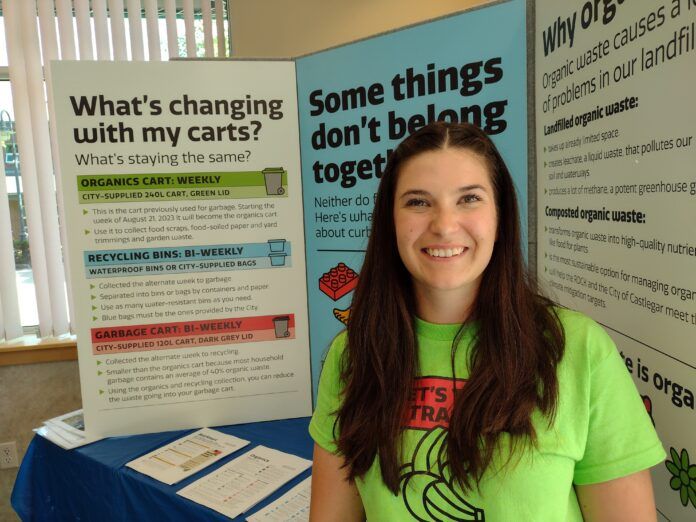Not quite three months into the new curbside composting program in Castlegar, contamination is becoming less of a problem but repeat offenders could soon face fines.
Organics ambassador Emily teBulte told city council this week the majority of organics carts have seen no contamination from the start.
Following a grace period during the first week of collection, carts have been tagged and rejected if heavily contaminated (filled with or overwhelmingly garbage). Carts with only a little contamination are still tagged for educational purposes but are not rejected.
TeBulte said initially the majority of contamination was the result of organics carts being filled with garbage due to confusion over which bin was which. However, this doesn’t happen anymore and contamination levels have steadily decreased.
“From the beginning a relatively small number of contaminated carts has resulted in a large quantity of contamination because our organics carts can hold up to five bags of garbage,” teBulte said. “Even if it’s only a few people, it can result in a decent amount of contamination.”
Contaminated organics loads are sent to the landfill at a higher cost, TeBulte said. While organics are charged $88 per ton, rejected loads are charged five times as much. However, to date the RDCK has only charged the city the garbage rate of $123 per ton.
Two of the four weekly collection days have seen contaminated carts drop to zero, while on the other two days there have been as few as five problem carts. However, they are not consistently at the same addresses. TeBulte also said there is less contamination on recycling weeks.
While contamination was initially due to organics carts full of garbage, now they are seeing Ziplock bags full of food; Styrofoam, plastic wrap and tin foil with food on them; colour paper, plastic, metal cans and other recyclables; and landscaping fabric.
TeButle said bin tagging is time consuming but has been an important part of ensuring the program’s success. “In most cases organics carts only had to be tagged for rejection once and the following week we saw behavior changes, which is pretty fantastic,” she said.
However, for those who aren’t getting the message, she recommended updating the city’s ticketing bylaw to allow fines for repeatedly contaminated carts. Corporate services director Tracey Butler said they are working on a bylaw amendment that would allow just that, which should come to council before year’s end.
Mayor Maria McFaddin commended teBulte on “an excellent job.”
“Communication has been great,” she said. “Even if people are frustrated around the program, nobody has complained they weren’t communicated to. Not everyone’s going to be happy about what we do but we want to make sure they’re in the conversation.”
Council previously heard the new program has already cut the amount of material going to the landfill by half.
TeButle said Castlegar’s organics stream has turned out to be largely yard waste, which has been good for the new regional composting facility near Salmo. Castlegar’s yard waste-heavy material is combined with food waste-heavy materials from other places to make “pretty fantastic” compost.




